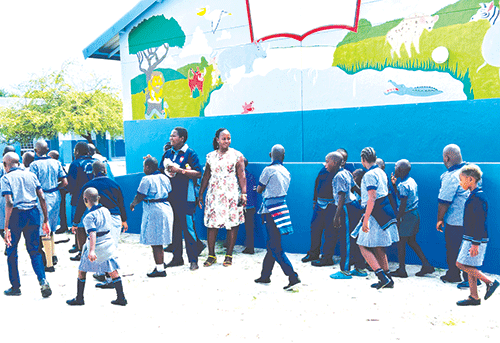ONGWEDIVA - The shortage of school places for children has not only affected conventional schools but also hit special schools too.
Eluwa Special School, the only government school catering for children with special education needs in northern Namibia, has not been able to take all the children that have come looking for places there, resulting in great concern for the parents.
This year, the school was forced to turn away a large number of intellectually challenged applicants due to limited space.
According to the principal of Eluwa’s Intellectual Impairment Section, Koluumba Niironda Nangombe, out of 346 applicants, only 64 were admitted.
Nangombe made an urgent appeal to other regions to establish special schools to meet the educational needs of children with disabilities.
“It is important that parents with mentally-challenged children take them to school so that they can start occupational therapy from the onset. I wish I could admit them all, but the problem is space,” she noted.
Nangombe said many children are not being kept at home because their parents are hiding them, but because there is simply nowhere to take them.
The Oshana region is also faced with a similar challenge at ordinary schools where there is a high demand for pre-primary and Grades 1, 8 and 11 placements. Parents are struggling to secure places for their children, with some visiting multiple schools in the hope of obtaining admission.
Sylvia Elago, a parent who recently transferred to the north, expressed concern as her child has not been admitted to Grade 11, despite a valid explanation.
A teacher from the Ehenye Primary School confirmed that classes are already full, particularly in pre-primary and Grade 1.
The high demand is attributed to duplications, as some parents apply for placements of a single child at several schools.
The migration of parents from one town to another is also believed to be one of the causes.
“The exact number of enrolled pupils will only be known after the second day of the academic year, as not all learners report for school on the first day,” said one of the teachers who preferred anonymity.
The Ministry of Education, Arts and Culture said it accommodates learners with visual, hearing, and intellectual impairment and learning difficulties in the respective schools.
“With regards to schools for learners with intellectual impairment we have three in Khomas and one in Oshana region,” said the ministry.
The ministry has collected data on learners with intellectual impairment not in school and is aware of the need, however, it said at the moment budget for capital projects is limited.
The ministry added that allocations will be done on a needs and priority basis.
These interventions include; Resource Units for the Intellectual Impairment (II) – classrooms allocated for the teaching of these learners attached to a mainstream school.
“Though this partly addresses the need, there are no workshops for these learners to learn skills training whereas this is happening at all resource schools,” the ministry said.
The ministry further said it has submitted a proposal for the building of at least six resource schools in six regions of Kavango East, Hardap, Omaheke, Ohangwena, Kunene and Khomas.
These schools will have fully equipped workshops and hostels, said the ministry.
-vkaapanda@nepc.com.na


